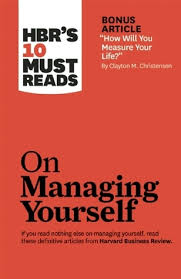HBR's 10 Must Reads on Managing Yourself: A Comprehensive White Paper
This white paper explores the key themes and actionable insights from Harvard Business Review's curated collection of 10 essential articles on managing yourself. These articles offer invaluable guidance for individuals seeking to enhance their professional and personal lives by developing self-awareness, mastering their time and energy, building resilience, and cultivating meaningful relationships.
1. "Know Yourself" by Peter F. Drucker
- Core Theme: Self-awareness is the foundation of effective self-management.
- Key Takeaways:
- Identify and understand your strengths, weaknesses, values, and aspirations.
- Regularly assess your performance and seek feedback from others.
- Set clear goals and prioritize tasks based on their impact and urgency.
- Develop a plan for continuous learning and improvement.
- Reference: Drucker, P. F. (1999). "Know Yourself." Harvard Business Review, 77(1), 74-80.
2. "Working with Your Strengths" by Marcus Buckingham and Donald O. Clifton
- Core Theme: Focus on and leverage your innate talents to achieve peak performance.
- Key Takeaways:
- Identify your signature strengths and find ways to utilize them in your work.
- Create an environment that supports and encourages the use of your strengths.
- Surround yourself with people who complement your strengths and help you overcome your weaknesses.
- Reference: Buckingham, M., & Clifton, D. O. (2001). "Working with Your Strengths." Harvard Business Review, 79(1), 50-58.
3. "Managing Oneself" by Peter F. Drucker
- Core Theme: Taking responsibility for your own career development and success.
- Key Takeaways:
- Set clear career goals and develop a plan to achieve them.
- Continuously learn and adapt to the changing demands of the workplace.
- Build and maintain strong professional relationships.
- Develop a personal brand that reflects your unique value proposition.
- Reference: Drucker, P. F. (1999). "Managing Oneself." Harvard Business Review, 77(1), 65-74.
4. "The Discipline of Buildng Character" by Joseph L. Badaracco Jr.
- Core Theme: Cultivating ethical behavior and integrity in all aspects of your life.
- Key Takeaways:
- Define your personal values and live in accordance with them.
- Make ethical decisions based on sound judgment and principled reasoning.
- Build trust and maintain strong relationships based on honesty and transparency.
- Take responsibility for your actions and their consequences.
- Reference: Badaracco, J. L., Jr. (1997). "The Discipline of Building Character." Harvard Business Review, 75(3), 117-126.
5. "Emotional Intelligence" by Daniel Goleman
- Core Theme: Developing and leveraging emotional intelligence for personal and professional success.
- Key Takeaways:
- Understand and manage your own emotions and the emotions of others.
- Build strong relationships based on empathy and compassion.
- Resolve conflict effectively and navigate challenging situations with grace.
- Develop self-awareness and self-regulation to improve your decision-making.
- Reference: Goleman, D. (1995). "Emotional Intelligence." Bantam Books.
6. "Managing for Creativity and Innovation" by Teresa Amabile
- Core Theme: Fostering a creative and innovative work environment.
- Key Takeaways:
- Encourage experimentation and risk-taking.
- Provide support and resources for creative endeavors.
- Celebrate and reward creativity and innovation.
- Create a culture of open communication and collaboration.
- Reference: Amabile, T. M. (1998). "How to Kill Creativity." Harvard Business Review, 76(5), 77-87.
7. "The Power of Habit: Why We Do What We Do in Life and Business" by Charles Duhigg
- Core Theme: Understanding the science of habit formation and leveraging it for personal change.
- Key Takeaways:
- Identify your existing habits and understand the underlying triggers and rewards.
- Develop new habits by creating new routines and reinforcing them with positive feedback.
- Break bad habits by identifying and disrupting the underlying patterns.
- Reference: Duhigg, C. (2012). "The Power of Habit: Why We Do What We Do in Life and Business." Random House.
8. "Mindset: The New Psychology of Success" by Carol S. Dweck
- Core Theme: The importance of cultivating a growth mindset for personal and professional development.
- Key Takeaways:
- Embrace challenges and view setbacks as opportunities for learning and growth.
- Develop a love of learning and a desire for continuous improvement.
- Persist in the face of obstacles and setbacks.
- Believe in your ability to learn and grow.
- Reference: Dweck, C. S. (2006). "Mindset: The New Psychology of Success." Random House.
9. "Drive: The Surprising Truth About What Motivates Us" by Daniel H. Pink
- Core Theme: Rethinking traditional motivation theories and exploring the power of intrinsic motivation.
- Key Takeaways:
- Focus on autonomy, mastery, and purpose to motivate and engage employees.
- Create a work environment that supports and encourages intrinsic motivation.
- Recognize and reward employees for their effort and contributions.
- Reference: Pink, D. H. (2009). "Drive: The Surprising Truth About What Motivates Us." Riverhead Books.
10. "The 7 Habits of Highly Effective People" by Stephen R. Covey
- Core Theme: Developing a principle-centered approach to personal and professional effectiveness.
- Key Takeaways:
- Be proactive and take responsibility for your own life.
- Begin with the end in mind and set clear goals and priorities.
- Put first things first and prioritize effectively.
- Think win-win and seek mutually beneficial solutions.
- Seek first to understand and then to be understood.
- Synergize and work effectively with others.
- Sharpen the saw and continuously improve yourself.
- Reference: Covey, S. R. (1989). "The 7 Habits of Highly Effective People." Simon & Schuster.
Conclusion
This white paper has provided an overview of HBR's 10 Must Reads on Managing Yourself, highlighting the key themes and actionable insights from each article. By applying the principles outlined in these articles, individuals can develop the skills and mindsets necessary to excel in their careers and achieve their full potential.
Disclaimer: This white paper is intended for informational purposes only and should not be construed as professional advice.
Note: This white paper provides a summary of key themes and insights. For a deeper understanding, it is recommended to read the full articles and explore the referenced books and resources.



